Pre-employment screening helps companies find top talent and understand what skills candidates bring to the table. It's a key step in building a strong team.
This guide compares Adaface and Eva AI, two pre-employment assessment platforms. We'll look at their features to help you decide which one fits your hiring needs best.
Table of contents
How does Adaface work?
Adaface is an AI-powered candidate assessment platform that helps companies screen and hire the best talent. It provides a range of tests to evaluate candidates on various skills like programming, logical reasoning, and more.
Recruiters use Adaface for its unique conversational assessments, which engage candidates in a friendly and interactive manner. This approach results in more accurate and candidate-friendly evaluations compared to traditional assessment methods.
Another reason recruiters prefer Adaface is its ability to design customized tests based on job descriptions. This ensures that the assessments are highly relevant to the role, saving time and improving the accuracy of candidate matching.
Adaface shines with its extensive proctoring features, including web and webcam proctoring, to ensure test integrity. For more details on these features, check our remote proctoring features. Additionally, Adaface provides seamless ATS integrations to streamline the recruitment workflow.
How does Eva AI work?
Eva AI is an assessment platform designed to streamline the hiring process by providing a range of skills assessments for various roles. It relies on artificial intelligence to customize the evaluation experience, aiming to simplify the task for recruiters and candidates alike.
At its core, Eva AI offers assessments across several skill categories, such as coding and personality tests, but falls short in areas like situational judgment and specialized skill tests. For instance, a recruiter looking to assess a candidate's technical skills might use Eva AI's general coding tests.
Some standout features of Eva AI include its user-friendly interface and automated scoring, which help recruiters save time on evaluations. The platform also supports personality assessments, adding a layer of insight into candidates' soft skills.
However, Eva AI lacks support for custom tests tailored to specific job descriptions, which could limit its utility for companies seeking to evaluate niche skills effectively. This can make it challenging for recruiters to align assessments precisely with their unique hiring needs.
Adaface vs Eva AI: Test libraries
Adaface and Eva AI both offer test libraries to assess various skills needed for different job roles. These libraries provide a variety of tests ranging from technical skills to soft skills, which are vital for comprehensive candidate evaluation.
Recruiters benefit from using test libraries as they help in efficiently identifying the best candidates for the job by assessing their skills before the interview stages. This saves time and ensures that only qualified candidates move forward in the hiring process.
Adaface's test library
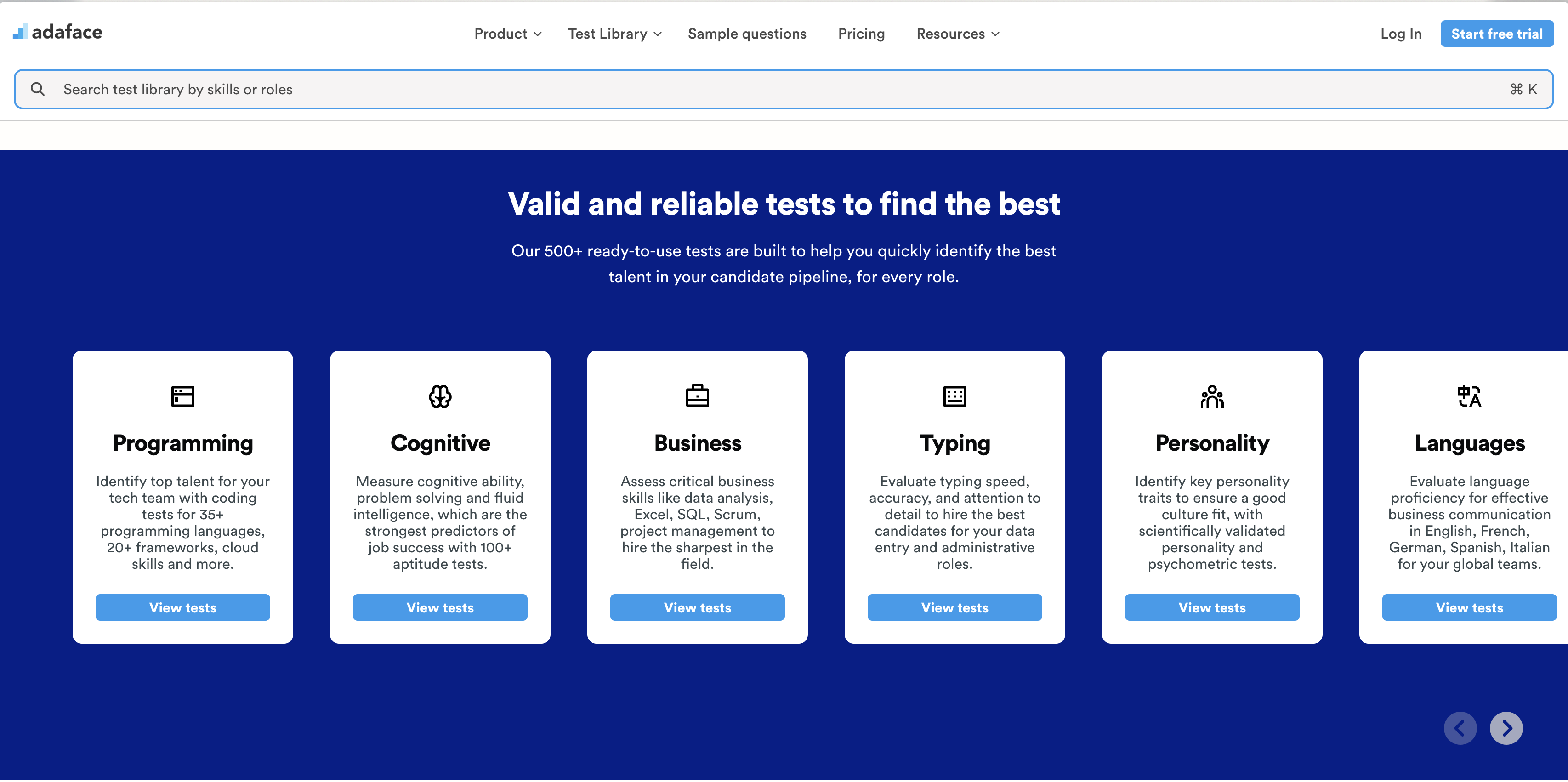
Adaface’s test library covers a wide range of assessments to meet diverse recruiting needs. Here’s what it includes:
- Programming tests, including coding challenges and scenario-based MCQs
- Situational Judgment tests
- Aptitude tests like logical, numerical, verbal, and more
- Business and job-specific tests
- Typing, personality, and multiple language tests (CEFR A1-C2)
- Finance, AI, and cloud computing tests
- Options to customize tests and add your own questions
- Ready-to-use tests for immediate deployment
Recruiters use Adaface’s library because it offers tailored assessments that match job descriptions perfectly. Custom questions can be designed specifically for their needs, which ensures a higher quality of hire. The wide array of tests also allows recruiters to screen for specific skills, whether it's soft skills or niche technical abilities.
Using Adaface’s test library is straightforward. Recruiters can select role-specific tests from the ready-to-use collection, or customize their own assessments. The platform also supports adding custom questions, making it adaptable to any hiring scenario.
Eva AI's test library
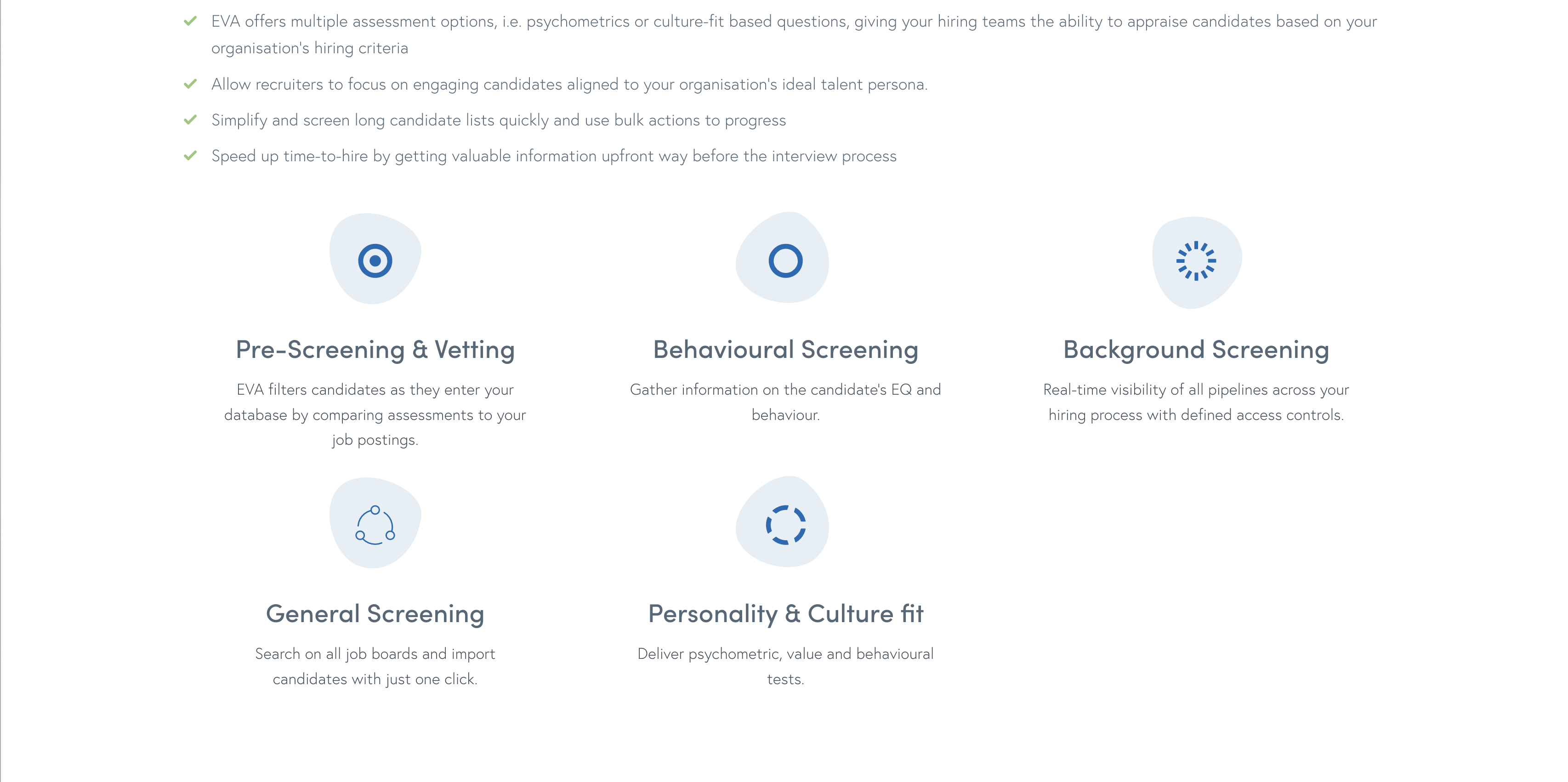
Eva AI offers a selection of ready-to-use tests primarily focused on personality and language skills. However, it lacks a variety of assessment types, such as coding, situational judgment, and aptitude tests, making it somewhat limited for diverse recruiting needs.
One of the selling points of Eva AI's test library is its personality tests, which can aid employers in understanding candidate traits better. This feature can be handy when looking for cultural fit, but it doesn't cover the technical skills that many roles require.
While Eva AI has its strengths, it misses out on crucial aspects like job-specific assessments and the ability to customize tests based on unique business needs. This can leave recruiters wanting more when it comes to evaluating the full spectrum of a candidate's capabilities.
Comparison of test libraries
Adaface vs Eva AI: Candidate experience and company branding
Candidate experience significantly impacts the perception of your company and the likelihood of completing an assessment. A seamless, user-friendly interface ensures candidates feel valued and respected throughout the process.
Key features to enhance candidate experience include mobile accessibility, conversational interfaces, and efficient support systems. These elements reduce friction and create a smoother journey for applicants.
Candidate experience and company branding with Adaface
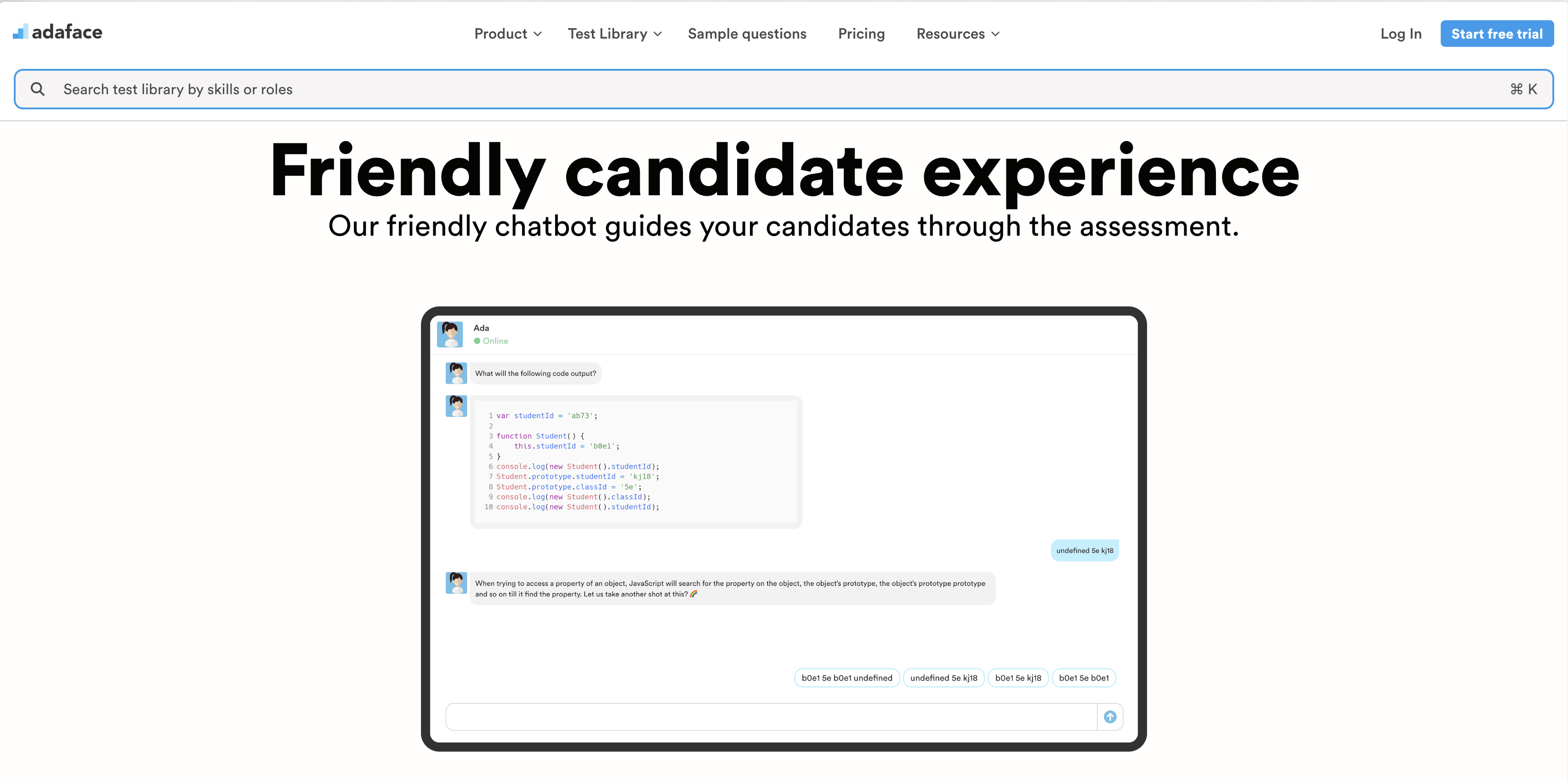
Adaface's standout feature is its conversational interface, which transforms traditional assessments into engaging experiences. This design approach makes candidates feel more at ease and better assessed.
Adaface is also mobile-friendly, allowing candidates to complete assessments from anywhere, at any time. This flexibility is particularly beneficial for non-coding evaluations, ensuring higher participation rates.
Supporting candidates with prompt email responses and an extensive help documentation repository ensures they have all the necessary resources to succeed. Adaface’s support system is structured to address queries quickly, minimizing candidate frustration.
Candidate experience and company branding with Eva AI
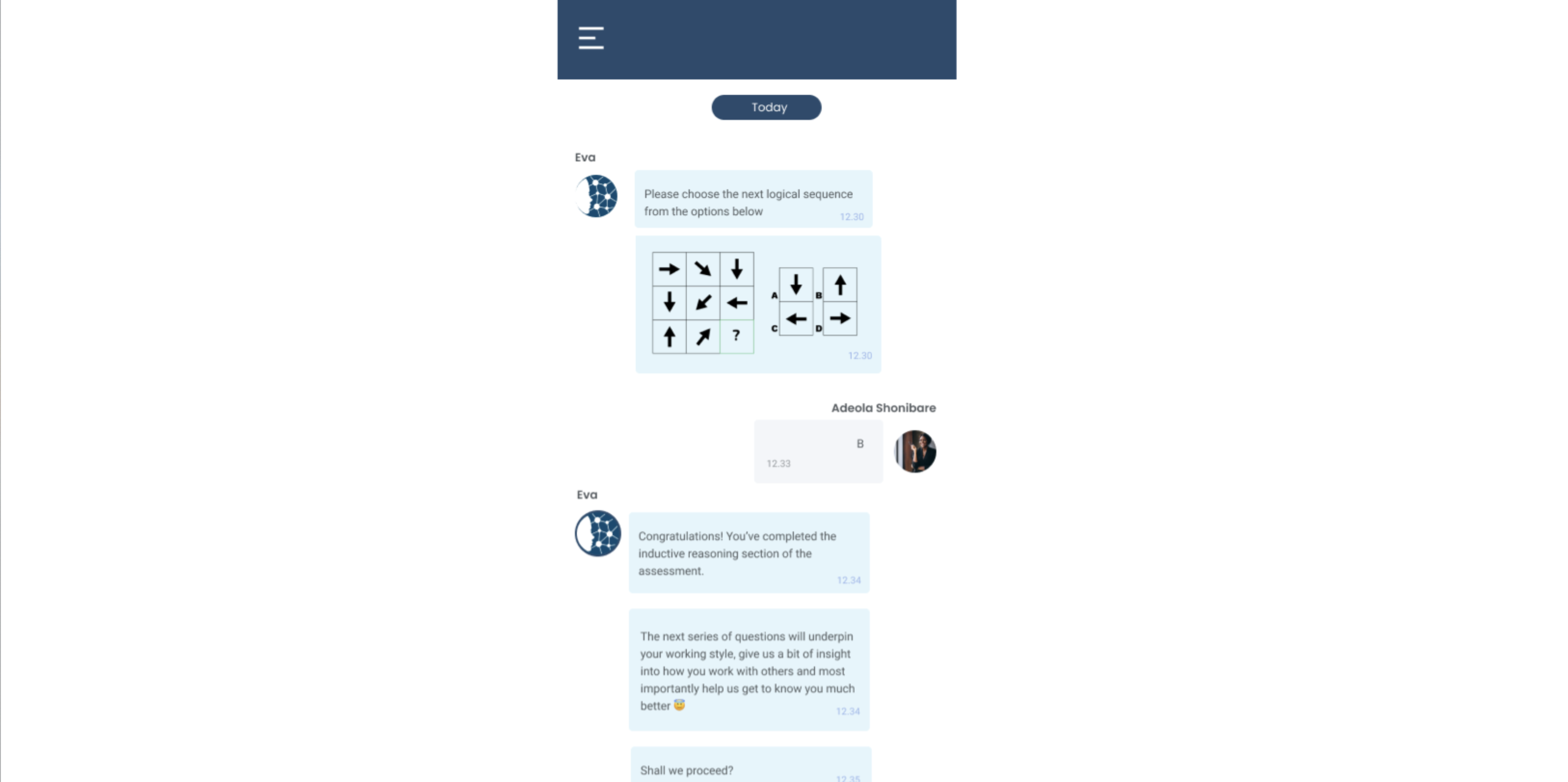
Eva AI provides a mobile-friendly assessment platform where candidates can take tests on-the-go. However, it lacks a conversational interface, making the experience feel more like an exam than an engaging interaction. This setup can create a disconnect between candidates and their assessment journey.
A key selling point of Eva AI is its mobile accessibility, allowing candidates to complete assessments anytime and anywhere. This flexibility can enhance the candidate experience by removing barriers and making the testing process more convenient.
One noticeable gap in Eva AI's offering is the absence of qualifying questions at the start of assessments. This feature can help candidates determine if they should proceed, saving time for both parties and ensuring a smoother experience overall.
Adaface vs Eva AI: Anti-cheating features
Ensuring fair play in pre-employment assessments is like keeping the integrity of a fun game. Anti-cheating features are a must to maintain this fairness, giving recruiters confidence in assessing true candidate skills.
Anti-cheating features of Adaface
Adaface stands out with its array of anti-cheating features designed to uphold the integrity of assessments. Key features include:
- Email authentication: Verifies the candidate's identity before starting the test.
- Time limits on tests: Ensures timely completion and accuracy.
- Web proctoring: Tracks browser activity to prevent tab-switching.
- Large question bank: Reduces the risk of question leaks with over 20K questions.
Adaface's web proctoring is a game-changer. It not only tracks if a candidate leaves the test tab but also logs their location and device information. This triple-layered approach makes it tough for anyone to bypass the system unnoticed.
Additionally, Adaface employs full screen proctoring, forcing candidates to keep the test window maximized, and social listening to detect and address any leaked questions swiftly. This proactive vigilance ensures a cheat-proof and fair assessment environment.
For more details, check out our remote proctoring features and learn everything about online proctoring.
Anti-cheating features of Eva AI
Eva AI provides some basic anti-cheating features, like user authentication and timed tests, which are essential for maintaining test integrity. However, it doesn't clearly outline any web or webcam proctoring features, leaving a few gaps in its proctoring capabilities.
One of Eva AI's selling points is its user authentication process, which ensures that the person taking the test is indeed the candidate. This feature can be particularly beneficial in scenarios where identity verification is crucial, such as high-stakes assessments.
However, the absence of more advanced proctoring measures—like IP address tracking or copy-paste protection—could leave candidates with opportunities to seek help during assessments. A more thorough anti-cheating arsenal could significantly boost the reliability of their evaluations.
Comparison of anti-cheating features
Adaface vs Eva AI: Pricing and free trial
Pricing for assessment products can vary greatly depending on the features and the scale of usage. Recruiters should expect transparency and flexibility in pricing.
Adaface pricing
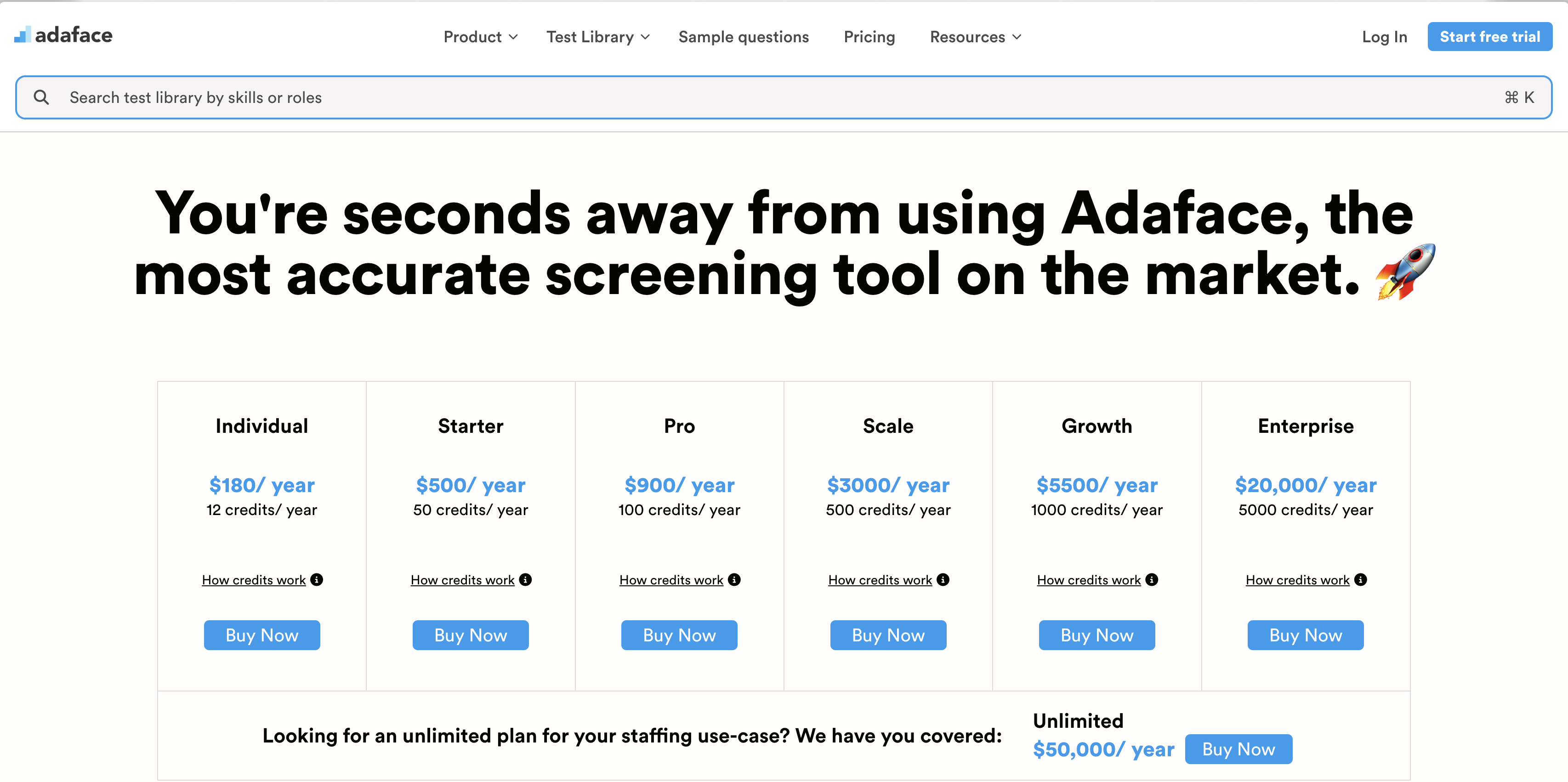
Adaface offers a variety of pricing plans designed to meet different hiring needs. Our plans are structured to provide flexibility and value for both small and large teams.
Here’s a quick overview of our pricing options:
- Individual Plan: $180 for small-scale needs.
- Starter Plan: $500 for 50 credits.
- Scale Plan: $3000 for 500 credits.
- Growth Plan: $5500 for 1000 credits.
- Enterprise Plan: $20000 for 400 credits.
- Unlimited Plan: $50000 per year for unlimited assessments.
With our transparent pricing, recruiters can easily choose a plan that fits their hiring requirements without any hidden costs. You can explore more details on our Adaface Pricing page.
Eva AI pricing
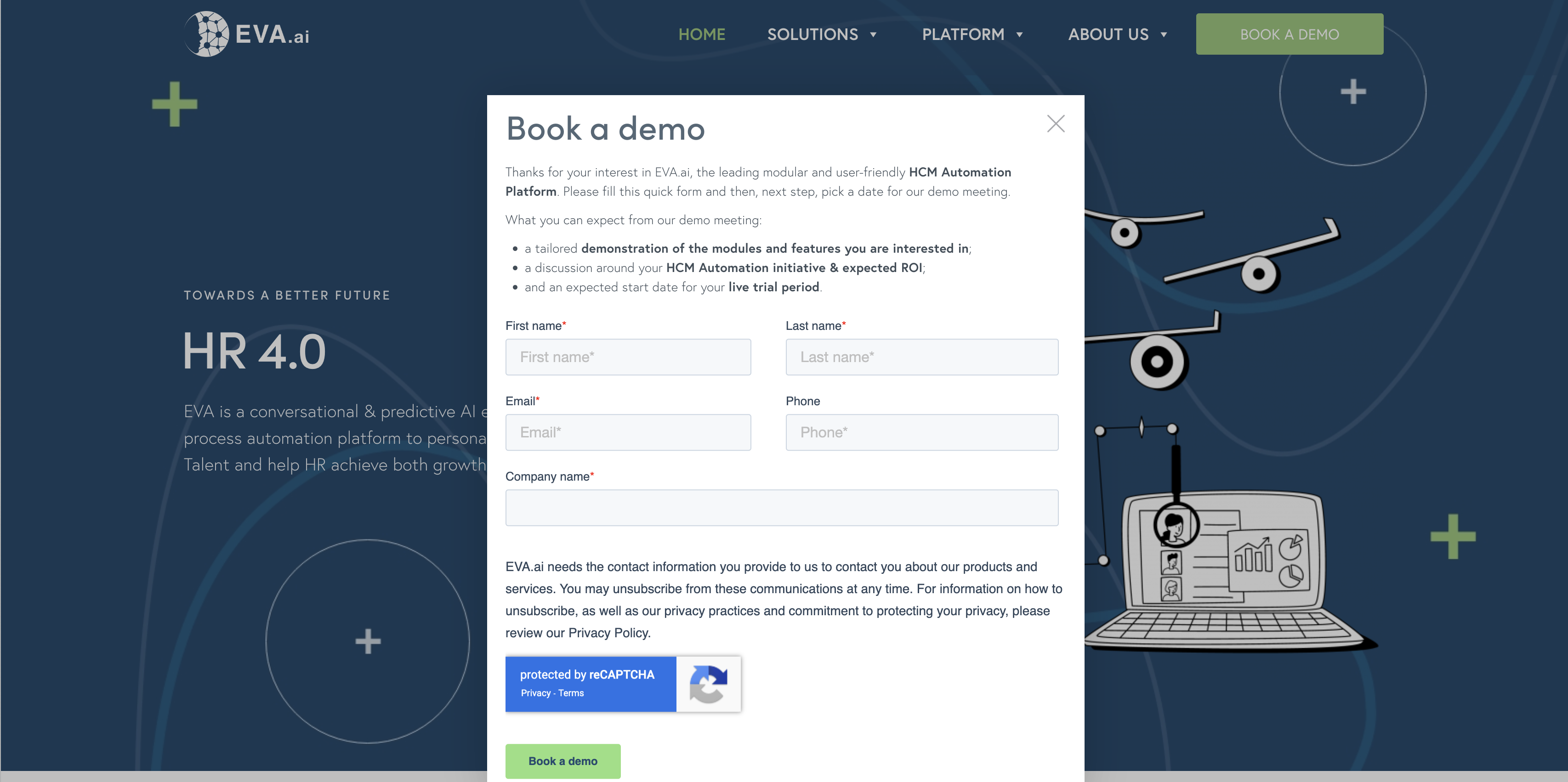
Eva AI opts for a more opaque pricing strategy, requiring potential customers to contact them directly for a quote. This lack of transparency can be a little frustrating for recruiters just trying to get a quick estimate. They don't offer a free trial either, so dipping a toe in the water to test the features isn't an option. For those interested in enterprise solutions, it's another case of having to reach out directly to Eva AI's sales team. Essentially, you're left in the dark until you pick up the phone.
One thing to think about is how not having transparent pricing or a free trial could make the evaluation process a bit cumbersome. Recruiters might find it tricky to gauge if the platform fits their needs without going through the entire sales loop first. This lack of immediate access and visibility into their pricing structure might slow down your decision-making process, which isn't ideal when you're in the fast-paced world of hiring.
Comparison of pricing
Adaface vs Eva AI: Scorecards, reporting and analytics
Recruiters need products with strong scorecards, reporting, and analytics features to make informed hiring decisions. These features allow for transparent candidate comparison and help identify top talent quickly and accurately.
Adaface scorecards, reporting and analytics
Adaface offers detailed scorecards, robust reporting, and insightful analytics. Recruiters can access PDF reports, public links for easy sharing, and export data in Excel and CSV formats. Additionally, benchmarking enables comparisons, making it easier to see where candidates stand.
Skill profiles provide a breakdown of candidate performance in various skills, complete with radar charts that include candidate scores, industry scores, and company averages. This helps recruiters pinpoint strengths and weaknesses effortlessly.
Features like skill-wise analysis and audit timelines allow recruiters to dive deeper into candidate performance and proctoring logs. Recruiters can compare multiple candidates at once in a single view, streamlining the selection process.
Check out a sample scorecard to see how Adaface's insights can aid your hiring decisions.
Eva AI scorecards, reporting and analytics
Eva AI provides a range of reporting features, focusing on delivering detailed insights for each candidate. Their reports offer a summary of candidate performance, noting scores and time taken for each test. Additionally, Eva AI allows users to review individual answers and overall candidate rankings.
For hiring managers, Eva AI offers practical tools to share insights with the team. Reports can be integrated into the ATS for seamless workflow and shared among team members for collaborative decision-making. These features are helpful for aligning the hiring team on a candidate's suitability.
However, there are certain aspects where Eva AI's reporting could be more robust. For instance, it remains unclear if they offer PDF or public report sharing options, and there's no mention of skills profile breakdowns or detailed audit timelines. These gaps may limit the depth of analysis recruiters can perform.
Comparison of scorecards, reporting and analytics
Adaface vs Eva AI: Enterprise and startup friendliness
An ideal product for enterprises and startups should offer seamless integration with existing systems, compliance with privacy regulations, and flexibility to scale as the organization grows. These features ensure that the platform can support diverse hiring needs without causing disruptions.
Adaface's enterprise and startup friendliness
Adaface shines with its ATS integrations, which make it easy for enterprises to streamline their hiring process without juggling multiple platforms. This integration ensures that recruiters can manage assessments directly from their existing HR systems.
For startups, Adaface's role-based access and unlimited team seats are game-changers. These features allow growing teams to collaborate and manage assessments effectively without worrying about additional costs or security issues.
Adaface also supports bulk actions and multiple question sets, which are particularly beneficial for enterprises engaging in large-scale hiring events. These features, combined with generative AI optimizations, provide a streamlined and efficient hiring process.
Eva AI's enterprise and startup friendliness
Eva AI offers a range of features tailored for both enterprises and startups, including ATS integrations and GDPR compliance to ensure smooth hiring processes. However, it lacks certain expansive tools like a Custom API and unlimited team seats, which could enhance scalability for larger organizations.
With role-based access and the ability to track candidate stages, Eva AI aims to cater to diverse organizational needs. This makes it easier for teams to manage candidates effectively, but the absence of bulk actions might slow down the hiring process during high-volume recruitment.
While Eva AI provides essential features for effective recruiting, it doesn't include options for multiple test sets or generative AI integrations. This limits the flexibility and innovative capabilities that enterprises may seek in a modern assessment platform.
Comparison of enterprise and startup friendliness
Adaface vs Eva AI: Assessment quality control
Quality control in assessments ensures that the tests accurately measure a candidate's skills and knowledge. Recruiters should care because it affects the reliability and fairness of the hiring process.
Adaface's quality control features
Adaface boasts a range of quality control features designed to maintain the integrity of its assessments. From before questions go live to ongoing test improvements, every stage is meticulously overseen.
We implement rigorous quality checks before any question is published. Additionally, our proprietary algorithms continuously enhance the quality of questions and tests in our library.
Feedback plays a significant role in our quality control. We actively gather input from both candidates and customers to refine and update our tests. For more details, you can explore how we design questions.
Eva AI's quality control features
Eva AI has quality checks in place before questions go live on their platform. This ensures that the questions added are relevant and help assess a candidate's skills accurately.
The platform uses AI-powered technology to create and evaluate questions. However, it's unclear how often Eva AI updates its question bank or incorporates user feedback to improve test quality.
While Eva AI focuses on AI-driven assessments, it's worth noting that some traditional quality control measures, such as social listening or replacing questions based on usage limits, are not explicitly mentioned in their process.
Comparison of quality control
Adaface vs Eva AI: Customer support
When it comes to assessment platforms, customer support can make or break the experience for recruiters. Great support means recruiters can focus on finding the right candidates without getting stuck in a tech tangle.
Adaface's customer support features
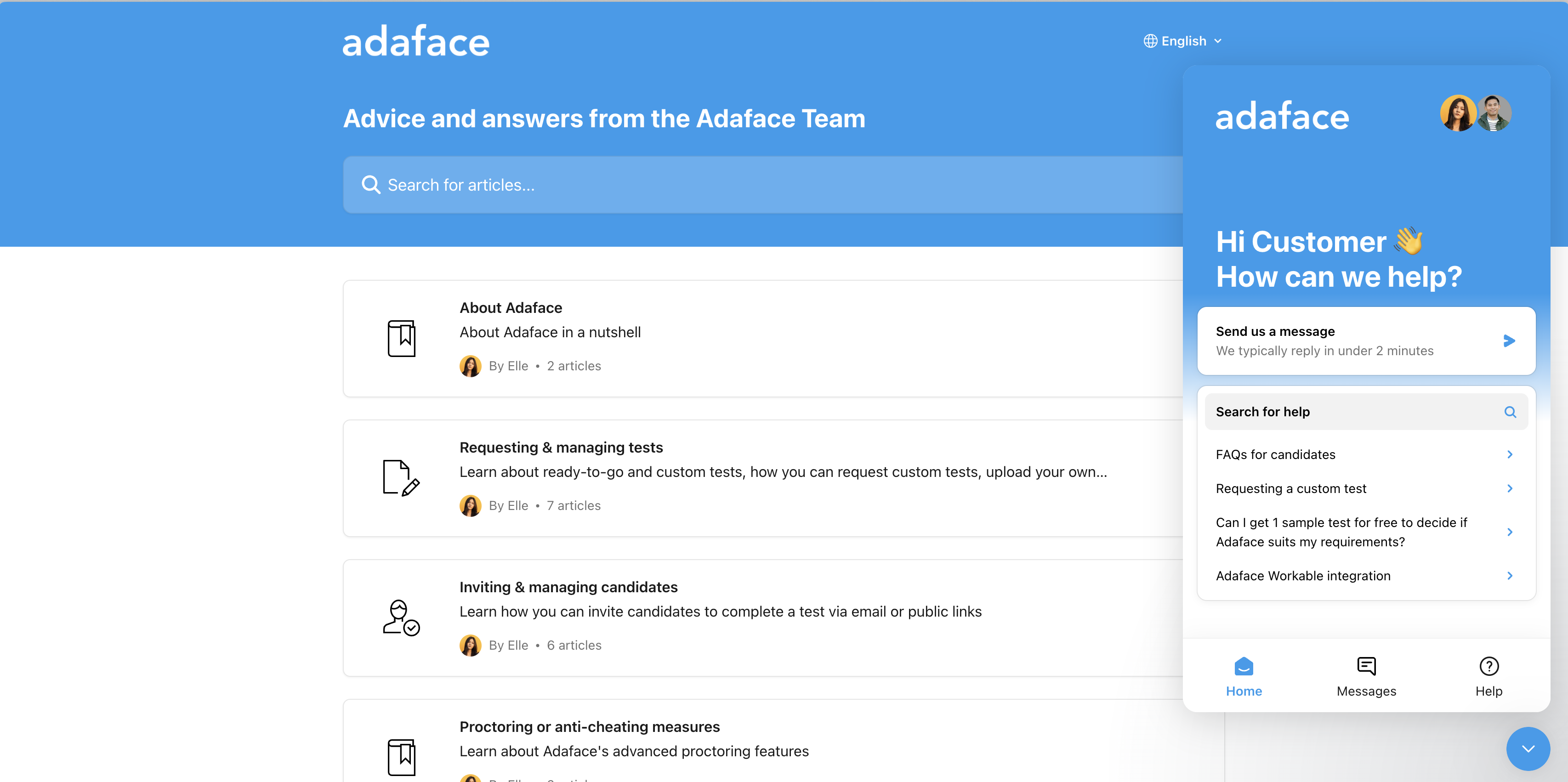
Adaface prides itself on offering multiple support channels including live chat, email, and phone assistance. This ensures that help is just a click or call away, making the hiring process smoother.
In addition, there’s a dedicated Help Center filled with resources, tutorials, and FAQs designed to empower recruiters. No more fishing in the dark for answers—everything is right at your fingertips.
With options for training and onboarding, Adaface ensures that users are well-equipped to navigate the platform. Plus, enterprise clients benefit from dedicated priority support, ensuring they have a reliable contact for all their needs. Explore more about our features on the Adaface Platform Features page.
Eva AI's customer support features
Eva AI offers support primarily through a chatbot, which can help users with basic queries. There is an email support option, but details on its availability and responsiveness remain unclear.
While Eva AI provides a chatbot for instant responses, users might find it lacking when needing personalized support or in-depth guidance, especially during onboarding and training.
Comparison of customer support
Adaface vs Eva AI: Final verdict
Both Adaface and Eva AI offer pre-employment assessments to evaluate job candidates. They aim to save time and reduce bias in the hiring process.
Adaface provides a wider range of tests, including programming, aptitude, and business skills assessments. Eva AI focuses more on personality and language tests.
Adaface stands out with its customizable tests based on job descriptions. This ensures each assessment matches the specific role you're hiring for.
Streamline hiring with skill tests
Eva AI lacks some features like coding tests and job-specific assessments. These can be important for technical roles or positions with unique skill requirements.
Pre-employment assessments help you evaluate candidates on multiple factors like skills, personality, and cultural fit. This gives a fuller picture of each applicant.
They also speed up hiring by letting you compare candidates objectively, without spending hours on resumes.
Adaface offers a more complete solution for most companies' hiring needs. Check out our plans or try our free trial to see how Adaface can improve your hiring process.
Adaface vs Eva AI FAQs
Adaface offers a broader range of tests including coding, situational judgment, and aptitude tests, while Eva AI lacks these features.
Yes, Adaface supports creating custom questions and adding your own questions to the test.
Yes, Adaface offers job-specific assessments for roles like customer service, marketing, sales, and more.
No, Eva AI does not provide cloud or AI-specific tests, whereas Adaface covers these areas extensively.
Yes, both Adaface and Eva AI are GDPR compliant.
Yes, Adaface tests are mobile-friendly, similar to Eva AI.

40 min skill tests.
No trick questions.
Accurate shortlisting.
We make it easy for you to find the best candidates in your pipeline with a 40 min skills test.
Try for freeRelated posts



